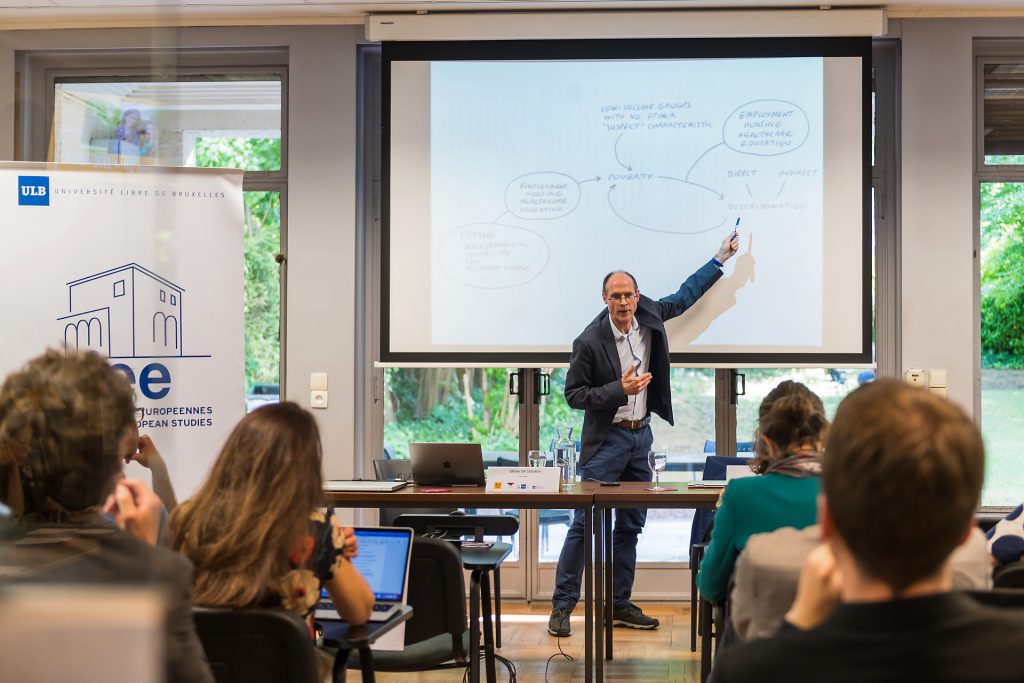Last May 11, 2022, UN Special Rapporteur on extreme poverty and human rights and UCLouvain Professor Olivier de Schutter inaugurated the #IDEAS22 Conference on (Dis)Integration from an (in)equality perspective with the keynote “Combating horizontal and vertical inequalities in the EU: the role of non-discrimination in a market integration perspective”. It was the occasion to officially launch the new Jean Monnet Centre of Excellence EUqualis, focused on (In)equality and the EU, coordinated by Professor Amandine Crespy at the Institut d’études européennes of the Université libre de Bruxelles.
Combating horizontal and vertical inequalities in the EU
The role of non-discrimination in a market integration perspective
Markets have a paradoxical relationship to the fight against discrimination. On the one hand, they “filter” discrimination, imposing on economic actors that they take decisions on the basis of rational considerations, rather than based on prejudice. On the other hand however, markets register social norms, including discriminatory bias. Against this background, this presentation assessed how the fight against discrimination relates to the establishment of an internal market, which is at the core of the European integration project.
Examining the fight against both horizontal and vertical inequalities, professor De Schutter made the case for the fight against vertical inequalities, including by the prohibition of discrimination on grounds of socio-economic disadvantage, as a key component of the “social market economy”, the model of capitalism to which the EU is committed.
Five questions to set up the debate
Professor De Schutter framed the discussion around five overarching questions around the role of antidiscrimination law and social policy to counteract the root of inequality in the EU.
- 1. Do We need antidiscrimination law in an open market economy?
- 2. Is meritocracy the antidote to discriminatory practices?
- 3. What are the respective functions of status-based antidiscrimination law and the prohibition of discrimination on grounds of socio-economic disadvantage in the fight for an inclusive society?
- 4. What would the prohibition of discrimination on grounds of socio-economic disadvantage contribute?
- 5. Is antidiscrimination law a plausible substitute for social policy?
“What we have is various statuses – race, ethnicity, sex, disability, the status of being a migrant that lead to poverty because in various spheres of life people face discrimination due to these characteristics they present”. De Schutter’s argument is that low income people who do not present any of the characteristics of traditional status-based discrimination, face a form of discrimination that both direct and indirectly leads to poverty being perpetuated and for cycles of poverty to be very difficult to break.
Discrimination may cause poverty. But poverty may also cause discrimination and this is underestimated in European law, say @DeSchutterO #IDEAS22 pic.twitter.com/6QKzVQBBLN
— IEE-ULB (Bruxelles) (@IEE_Bruxelles) May 11, 2022
Meritocracy, antidiscrimination law and social policies
“Merit” as an opposing concept to counteract “prejudice” was questionned by Prof. De Schutter, who argued that:
- It neglects the weight of the inherited life chances
- It rewards the wrong kind of qualities
- It creates the conditions for a competing and exhausting society – a “rat race” in which all end up losing
- It leads the winner of the system to believe in their superiority – and the losers to believe in their inferiority
- It underestimates anti-poor prejudice: povertyism
For Professor De Schutter it might be a tempting strategy for the EU to act as if antidiscrimination law could be a plausible substitute for social policy, since achieving consensus on “the weaker norm of non-discrimination -after all who is for discrimination here? – than to achieve consensus on strengthening the welfare state”.
It would be very dangerous, concluded Prof. De Schutter, to believe that imposing a prohibition of discrimination on the grounds of socio-economic disadvantage can become a substitute for social policies.
About the IDEAS22 conference
The Interdisciplinary conference on European Advanced Studies (IDEAS) The Institute for European Studies of the ULB was the relaunch of the Institute’s biennial conference under the new title: Interdisciplinary conference on European Advanced Studies (IDEAS). The three-day scientific event organised by the Institut d’études européennes of the Université libre de Bruxelles (IEE-ULB) in collaboration with the Institute for European Studies of the Vrije Universiteit Brussel (IES-VUB) and the Politics and International Studies Department at the University of Warwick (PaIS-UoW) took place in Brussels from May 11 to 13, 2022 under the title (Dis)Integration from an (in)equality perspective.




